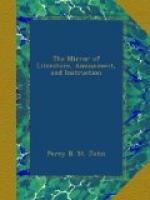* * * * *
The magnificent bishop of Durham, Antony Beke, once gave forty shillings for as many fresh herrings; and hearing someone say, “This cloth is so dear that even bishop Antony would not venture to pay for it,” immediately ordered it to be brought and cut up into horse-cloths.
* * * * *
SOLIMAN “THE GREAT.”
Here is a specimen of the magnificence with which this historical butcher treated his fellow-creatures:—
Among the many distinctions of Soliman’s reign must be noticed the increased diplomatic intercourse with European nations. Three years after the capture of Rhodes, appeared the first French ambassador at the Ottoman Porte; he received a robe of honour, a present of two hundred ducats, and, what was more to his purpose, a promise of a campaign in Hungary, which should engage on that side the arms of Charles and his brother, Ferdinand. Soliman kept his promise. At the head of 100,000 men and 300 pieces of artillery, he commenced this memorable campaign. On the fatal field of Mohacs the fate of Hungary was decided in an unequal fight. King Lewis, as he fled from the Turkish sabres, was drowned in a morass. The next day the sultan received in state the compliments of his officers. The heads of 2,000 of the slain, including those of seven bishops and many of the nobility, were piled up as a trophy before his tent. Seven days after the battle, a tumultuous cry arose in the camp to massacre the prisoners and peasants—and in consequence 4,000 men were put to the sword. The keys of Buda were sent to the conqueror, who celebrated the Feast of Bairam in the castle of the Hungarian kings. Fourteen days afterwards he began to retire—bloodshed and devastation marking the course of his army. To Moroth, belonging to the Bishop of Gran, many thousands of the people had retired with their property, relying on the strength of the castle; the Turkish artillery, however, soon levelled it, and the wretched fugitives were indiscriminately butchered. No less than 25,000 fell here; and the whole number of the Hungarians destroyed in the barbarous warfare of this single campaign amounted to at least 200,000 souls.—Foreign Quarterly Review.
* * * * *
LONG SNOW.
In 1614, there was one of the heaviest and longest snows which has ever been remembered in the north of England. The Parochial Register, of Wotton Gilbert, states that it began on the 5th of January, and continued to snow more or less every day, (the heaviest fall being on the 22nd of February,) till the 12th of March,—to the great loss of cattle, and of human life as well.




